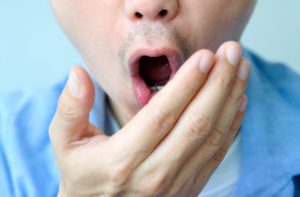
If you’re worried about bad breath, you are not alone! We’re all susceptible to this condition, whether it’s due to not-so-fresh breath in the morning when you wake up, or from the onions on the salad you ate at lunch. Usually, it can be addressed with a positive oral care routine – or mints or gum in a pinch. For those with dentures, however, there may be additional challenges. If you have noticed an undesirable odor and think it might be coming from your dentures, continue reading to learn what you can do.
Keep Your Dentures Clean
Appropriate maintenance is essential to keeping your dentures clean. It also ensures germs that cause bad breath (among other issues) don’t have the chance to thrive! By following these tips, you can ensure that your dentures are clear of smell-inducing bacteria:
- Rinse after eating. Removing your dentures and running them under running water after meals will wash away leftover food that attracts germs.
- Cleanse your mouth, too. Wash your mouth so that when you put your dentures back in, they’re not going into a dirty mouth.
- Brush them daily. Just like your natural teeth, your dentures require regular, thorough brushing to remove any plaque growth. Use a soft-bristled brush and non-abrasive denture cleaner.
- Soak them at night. Placing your dentures in cool water, or a denture-cleaning solution, overnight prevents bacteria from developing.
Regularly removing food particles and plaque means that your dentures stay fresh and don’t develop an unpleasant aroma.
Don’t Let Your Mouth Dry Out
In addition to keeping your dentures wet, you want to keep your mouth moist, too! Dry mouth is a common contributor to bad breath because saliva acts as a natural sterilizer due to its acidity. Bacteria are more likely to flourish without enough saliva in the mouth, which can lead to bad breath. To avoid dry mouth, try:
- Drinking water. If you’re well hydrated, your mouth will produce the saliva it needs to flush away smelly particles.
- Using alcohol-free mouthwash. Solutions that contain alcohol are more likely to dry out your mouth.
- Checking your medication. Some prescription drugs cause dry mouth as a side effect. If this is the case, talk with your doctor about possible alternatives.
- Passing on caffeine and alcohol. These contain diuretics that can lead to dehydration, and thus dry mouth.
Your dentures are also specifically at risk if they dry out because they can crack or warp, giving bacteria convenient places to thrive. Rinsing your dentures after meals and leaving them in solution overnight will ensure they remain pliable and healthy.
Don’t Miss Dentist Appointments
Dry mouth isn’t the only cause of bad breath! Other culprits can include:
- Gum disease
- Cavities or infection
- Neglect of teeth or gums long-term
- Other underlying health issues
If you are missing natural teeth, you might assume that you’re less susceptible to tooth decay, which can be true to a degree. However, you can still develop other oral health issues that need to be addressed. That means it’s imperative that you maintain regular visits to your dentist.
Not only that, but your dentist has the right tools and equipment necessary to repair your dentures if they ever become cracked or damaged. They can also check that everything still fits properly so that bacteria are less likely to thrive between your dentures and your gums.
If you have noticed that your dentures have contributed to your bad breath, proper cleaning and care can help resolve the issue. If it doesn’t improve or gets worse, it’s time to make an appointment with your dentist!
About the Practice
At Columbus Dental Arts, patients have access to two highly qualified practitioners who go above and beyond to meet their dental care needs. They can provide treatment to you and the whole family, whether you need checkups and cleanings, or more complicated restorative work or repair. If you’re having concerns about your dentures and would like to make an appointment, please feel free to contact the office on the website or by calling (609) 324-9500.
